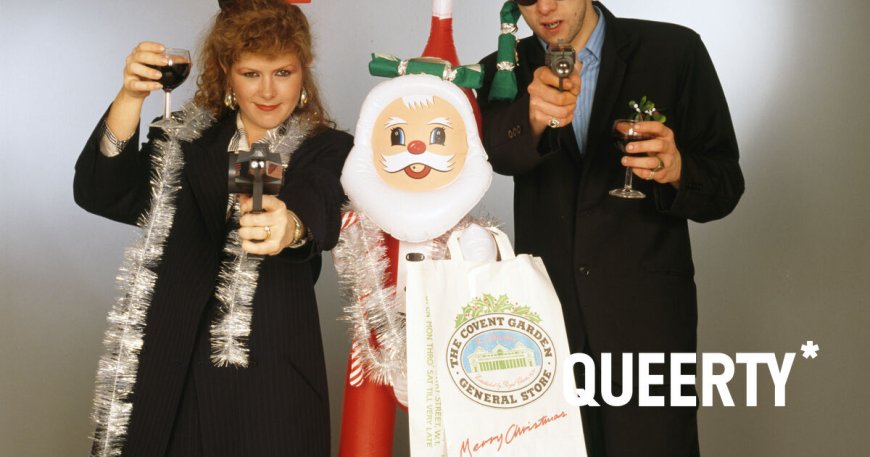‘Fairytale of New York’ remains a Christmas classic despite that one very problematic lyric
'Fairytale of New York' remains a Christmas classic in frontman Shane MacGowan's passing, despite that problematic lyric


‘Tis the season for the least festive song of the season.
Despite its cult status, The Pogues’ “Fairytale of New York” might just be the most anti-Christmas song out there.
From a New York City drunk tank, an Irish immigrant reminisces on his lost youth and bickers with his lover –– brought to life by the perfectly feisty voice of Kristy MacColl –– on Christmas Eve.
In a genre defined by Mariah Carey-esque gloss and capitalist dreams, frontman Shane MacGowan’s disillusioned perspective appealed to a cynical subsection of the LGBTQ+ community.
Even with that controversial lyric. (You know, the one that rhymes with maggot.)
It’s a complicated legacy and connection that makes MacGowan’s passing especially heart-rending. The Irish singer-songwriter died Thursday, November 30 at 65-years-old after being diagnosed with encephalitis last year.
MacGowan referred to “Fairytale of New York,” the UK’s most-played Christmas song of the 21st century, as the Celtic rock group’s “Bohemian Rhapsody.”
Still, it never reached coveted chart-topper status on the UK’s Christmas Top 20. After the somber tune’s release, it peaked at No. 2 behind the Pet Shop Boys’ “Always on Mind.” (MacGowan quipped that they were “beaten by two queens a drum machine.”)
The band recorded the call-and-response track for their third album If I Should Fall from Grace with God with Steve Lillywhite. It was the British producer who suggested that his wife –– the late MacColl –– sing the female character’s parts.
Although she provided “the right measure of viciousness and femininity and romance,” her character’s lines (which MacColl had no hand in penning) led to both boycotting and censorship of the track.
As you may recall, after reminiscing on halcyon years –– “Sinatra was swinging / All the drunks they were singing / We kissed on a corner / Then danced through the night” –– the two vocalists trade lyrical barbs.
The realities of addiction, depression, and dead dreams hit as MacGowan’s character jeers, “You’re an old slut on junk / Lying there almost dead on a drip in that bed.” In response, MacColl retorts: “You scumbag, you maggot / You cheap lousy f*****.” Oof.
Understandably, many were offended by usage of the slur, especially in years following its release.
Its intention was muddied by the context of its appearance, which was enough to appease some critics. Still, in a 1992 performance on Top of the Pops, MacColl changed the line to “You’re cheap and you’re haggard,” an alteration that’s since been adopted by radio stations across the world.
Furthermore, the fact that the group included openly gay guitarist Philip Chevron and MacGowan himself was subject to a “gay panic” assault in 2004 helped assumptions that it was not outright anti-LGBTQ+ track.
However, the BBC censored the word in 2007 before reversing the decision and then doubling back in 2020.
Shane McGowan gives us a statement with his reaction to the #FairytaleofNewYork censorship calls @VirginMedia_One #TonightVMT pic.twitter.com/LudzWjZK9l— TonightVMTV (@TonightVMTV) December 6, 2018
In 2018, MacGowan finally responded to the critiques in a statement, describing the female character as someone who “is not supposed to be a nice person, or even a wholesome person. She is a woman of a certain generation at a certain time in history and she is down on her luck and desperate.”
He added, “If people don’t understand that I was trying to accurately portray the character as authentically as possible then I am absolutely fine with them bleeping the word but I don’t want to get into an argument.”
Yet, that hasn’t stopped following generations from arguing about it. In 2021, Pink News called it a “tired debate … for sweet precious clickbait.”
It’s a sentiment that’s been further echoed by other members of the LGBTQ+ community. In the Independent, gay writer Larry Womack called the slur “sloppy and unnecessary, yet efficient and somehow perfect in its wild barbarism.”
“[The song] was meant to exist outside polite society, where people know that junkies who scream horrible things at their partners are still worthy of love,” he explained.
But, where does that leave us now?
Outside of “Fairytale of New York,” MacGowan and The Pogues were known for giving a voice to the working class, writing folk ditties that spoke to a stuck generation.
If we can forgive a single word –– one that almost certainly wouldn’t be included if the song was written today –– perhaps we can appreciate the band’s message at-large.
After all, there’s a reason why it continues to be a holiday staple. The track recently appeared in Netflix‘s Dash & Lily and Mr. Taylor Swift football player Travis Kelce and his brother recorded their own spin on the track this year.
In MacGowan’s memory, let us appreciate holidays spent alone, reckoning, and on the fringe. In a genre defined by “Jingle Bells” and Tiffany’s bracelets under the tree, The Pogues spoke to a population doing their best during the winter months.
We raise a glass to “the boys of the NYPD choir”… and a young Matt Dillon in the music video.
While you’re here, check out Queerty’s 2023 Holiday Playlist and be sure to follow us, too!

 Mark
Mark 





